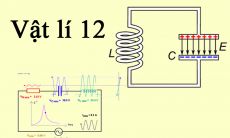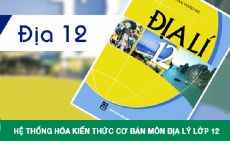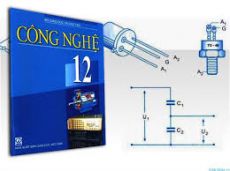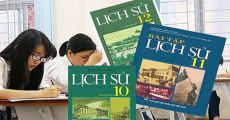Đề thi thử THPT QG năm 2021 môn Tiếng Anh
Trường THPT Lương Thế Vinh
-
Câu 1:
Indicate the word whose underlined part differs from the other three in pronunciation: corrects, details, forgets, rethinks
-
Câu 2:
Indicate the word whose underlined part differs from the other three in pronunciation: fishing, middle, picture, find
-
Câu 3:
Indicate the word that differs from the other three in the position primary stress: raincoat, enjoy, allow, prepare
-
Câu 4:
Indicate the word that differs from the other three in the position primary stress: wonderful, family, attention, decorate
-
Mark the letter A, B, C, or D on your answer sheet to indicate the correct answer to each of the following questions.
Câu 5:
If he ______ the lesson yesterday, he could have done the test better.
A. has reviewed
B. had reviewed
C. will review
D. reviewed
-
Câu 6:
We ______ the roof for Mrs. Smith, an elderly childless woman, when it ______ with rain.
A. were mending - was pouring
B. mended - poured
C. mended - was pouring
D. were mending - poured
-
Câu 7:
A correction pen is used for ______ your writing mistakes.
A. cover
B. covered
C. covering
D. to cover
-
Câu 8:
Your sister won’t go on vacation, ______?
A. will she
B. does she
C. did she
D. has she
-
Câu 9:
The bus ______ on the way here, so I was half an hour late for my appointment.
A. got off
B. come apart
C. broke down
D. set out
-
Câu 10:
You don't usually have to go to _______ hospital to have your ears cleaned.
A. a
B. an
C. the
D. x
-
Câu 11:
I hope you ______ the point of everything your father and I have done for you.
A. annoy
B. have
C. see
D. take
-
Câu 12:
The use of computers aids in teaching, ______ the role of teachers is still very important.
A. yet
B. although
C. so that
D. because
-
Câu 13:
The ______ in my neighbourhood are well cared by the authorities.
A. disabilities
B. inability
C. unable
D. disabled
-
Câu 14:
Sometimes in a bad situation, there may still be some good things. Try not to throw the ______ out with the bathwater.
A. fish
B. duck
C. baby
D. child
-
Câu 15:
There are so many ______ names now that it is impossible to remember them all.
A. brand
B. model
C. trademark
D. logo
-
Câu 16:
Can you translate this passage ______ German?
A. to
B. into
C. with
D. among
-
Câu 17:
She saw a mouse ______.
A. when she was having a bath
B. as long as she had a bath
C. as she had had a bath
D. as soon as she has had a bath
-
Câu 18:
The Queen Elizabeth is the largest ship ______ on the Clyde.
A. building
B. was building
C. built
D. was built
-
Câu 19:
The ______ of maintaining a safe environment are not just the concern of the government.
A. economy
B. economics
C. economic
D. economist
-
Mark the letter A, B, C, or D on your answer sheet to indicate the word(s) CLOSEST in meaning to the underlined word(s) in each of the following questions.
Câu 20:
People in the mountainous areas are still in the habit of destroying forests for cultivation.
A. planting
B. farming
C. industry
D. wood
-
Câu 21:
It is difficult to assess the building's value properly without seeing it
A. originate
B. congratulate
C. estimate
D. evaluate
-
Mark the letter A, B, C, or D on your answer sheet to indicate the word(s) OPPOSITE in meaning to the underlined word(s) in each of the following questions.
Câu 22:
The forces behind the women's liberation movement vary from culture to culture.
A. change quickly
B. increase sharply
C. move forward
D. stay unchanged
-
Câu 23:
If we use robots instead of humans, many people may be out of work.
A. employed
B. jobless
C. unemployed
D. busy
-
Mark the letter A, B, C, or D on your answer sheet to indicate the option that best completes each of the following exchanges.
Câu 24:
- Huy: “I would like some more tea.” - Dung: “______”
A. Well, I’d rather have coffee.
B. Certainly you are.
C. I’m sorry. I haven’t got any left.
D. No. I’ve had enough.
-
Câu 25:
- Nam: “Do you enjoy the movie yesterday?” - Mai: “_________”
A. Not really. I couldn’t follow the story.
B. Yes, it’s warmer than today.
C. No, I dislike moving.
D. Certainly, I’d be glad to.
-
Read the following passage and mark the letter A, B, C, or D on your answer sheet to indicate the correct word or phrase that best fits each of the numbered blanks from 26 to 30.
One of the greatest concerns parents have when facing an international move is "What schooling will be available to my child? Will my child be disadvantaged academically as a result of this move?" (26) ______ this fear is certainly strongest in families moving overseas for the first time, even those (27) ______ may be more experienced often have concerns about their children's education.
Dr. Ernest Mannino, Director of the State Department's Office of Overseas Schools, and Dr. Keith Miller, Deputy Director of the office, spoke candidly about some of the common concerns parents have regarding the education of their children. Dr. Mannino and Dr. Miller (28) ______ parents against making assumptions about their children's education. To make an educated choice, parents need to think through schooling issues and to research post schools as far in advance of a move as possible.
Children who are internationally mobile have many choices of schools to attend. In most major cities, there are schools (29) _______ on the U.S., French, German, and British systems. (30) ______ parents also choose to become their children's teachers through home education. Which school is appropriate for your child is an individual decision based on many factors.
Câu 26:
(26)...........................
A. When
B. Because
C. Therefore
D. Although
-
Câu 27:
(27).......................
A. who
B. which
C. whose
D. whom
-
Câu 28:
(28).......................
A. discourage
B. caution
C. oppose
D. approve
-
Câu 29:
(29).....................
A. based
B. set
C. relied
D. made
-
Câu 30:
(30)...................
A. Any
B. Little
C. Some
D. A little
-
Read the following passage and mark the letter A, B, C, or D on your answer sheet to indicate the correct answer to each of the questions from 31 to 35.
These following tips may help you make a good impression on your job interviewer during the interview: Before entering enquire by saying, "May I come in sir/madam?". If the door was closed before you entered, make sure you shut the door behind you softly.
Look at the interviewer and confidently say 'Good day sir/madam'. If the interviewer wants to shake hands, then offer a firm grip first maintaining eye contact and a smile.
Seek permission to sit down. If the interviewer is standing, wait for them to sit down first before you take your seat.
An alert interviewee would diffuse the tense situation with light-hearted humour and immediately set rapport with the interviewer. The interviewer normally pays more attention if you display an enthusiasm in whatever you say. This enthusiasm comes across in the energetic way you put forward your ideas.
You should maintain a cheerful disposition throughout the interview. A little humour or wit thrown in the discussion occasionally enables the interviewer to look at the pleasant side of your personality.
You must maintain eye contact with the interviewer. This shows your self-confidence and honesty. Many interviewees while answering questions, tend to look away. This conveys you are concealing your own anxiety, fear and lack of confidence. Maintaining an eye contact is a difficult process. As the circumstances in an interview are different, the value of eye contact is tremendous in making a personal impact.
Interviewers appreciate a natural person rather than an actor. It is best for you to talk in natural manner because then you appear genuine.
Câu 31:
What is the main idea of the passage?
A. Tips to make a good impression when attending job interview
B. The importance of eye contact when interviewing
C. Handshake in the beginning of an interview is essential
D. How humorous you should be in a job interview
-
Câu 32:
Which of the following is TRUE about advice for an interviewee as stated in the passage?
A. You should slam the door after entering the room.
B. You don’t need to ask for a permission before sitting.
C. Eye contact is necessary in a job interview.
D. Shaking hands is a must in a job interview.
-
Câu 33:
The word “rapport” in paragraph 4 mostly means ______.
A. long conversation
B. tense situation
C. good impression
D. friendly relationship
-
Câu 34:
According to the passage, things advised in a job interview do not include ______.
A. lack of confident
B. cheerful disposition
C. honesty
D. sense of humour
-
Câu 35:
The word “This” in the last paragraph refer to ______.
A. personality
B. eye contact
C. interviewer
D. self-confidence
-
Read the following passage and mark the letter A, B, C, or D on your answer sheet to indicate the correct answer to each of the questions from 36 to 42.
Cambridge University is considering axing compulsory written exams, allowing students to use laptops or iPads instead, after tutors complained that students’ handwriting is becoming illegible. Academics say the move, which would bring an end to over 800 years of tradition, has come about because students rely too heavily on laptops in lectures, and are losing the ability to write by hand.
Dr Sarah Pearsall, a senior lecturer at Cambridge University, said handwriting is becoming a “lost art” among the current generation of students. She added, “It’s increasingly hard for our examiners to read students’ scripts. Those with illegible writing are forced to come back to their college during the summer holidays to read their answers aloud in the presence of two university administrators. It’s extraordinarily commendable that the University is considering reforms to its examination practices.”
Sir Anthony Seldon, Vice-Chancellor of the University of Buckingham, said it is inevitable that universities will move to computers as handwriting deteriorates in the coming years. “We have to accept the reality. Handwriting has now become an optional, not a necessary, part of education. There simply isn’t the same time in the curriculum for learning elegant, beautiful handwriting. Life is so quick now. Everybody writes as if they were a doctor writing a prescription,” he said. “Handwriting is not necessary for great thought, great English, or great intelligence. Some of our finest wordsmiths today write using laptops, and we have to fight to preserve what is really important, such as the use of great English or great sentence structures.”
Others, however, were not very positive about the move. Tracey Trussell, a handwriting expert, urged Cambridge to ensure that students continue to write by hand. She said, “It’s vital that people continue to write by hand. Writing by hand improves memory and equates to a higher rate of comprehension and information retention.” There is also concern that schools could follow Cambridge’s example by moving away from handwriting. Dr Jane Medwell, Associate Professor of Education at the University of Nottingham, is concerned that scrapping handwritten exams in universities could prompt “downward curriculum pressure” on primary and secondary schools to follow suit.
Câu 36:
Which is the most suitable title for the passage?
A. Cambridge University in an Attempt to Improve Students’ Handwriting
B. Cambridge University Pondering Changes to its Exam Practices
C. Cambridge University Attacked again for Abolishing Written Exams
D. Cambridge University to Replace Written with Oral Exams
-
Câu 37:
According to paragraph 1, what is the long-standing tradition of Cambridge University?
A. offering academic tutorials
B. organising handwritten exams
C. relying heavily on technology
D. training students in legible handwriting
-
Câu 38:
The word “Those” in paragraph 2 refers to ______.
A. examiners
B. students
C. scripts
D. administrators
-
Câu 39:
The word “deteriorates” in paragraph 3 is closest in meaning to ______.
A. remains unchanged
B. becomes more important
C. improves gradually
D. gets worse and worse
-
Câu 40:
According to the passage, what is the benefit of writing by hand?
A. It enhances the ability to remember information.
B. It guarantees desirable academic performance.
C. It facilitates the process of information exchange.
D. It relieves students of unnecessary pressure.
-
Câu 41:
The word “scrapping” in paragraph 4 is closest in meaning to ______.
A. reconsidering
B. eliminating
C. introducing
D. discouraging
-
Câu 42:
Which statements is TRUE, according to the passage?
A. Cambridge University’s move away from handwriting has already set an unprecedented example for other schools to follow.
B. Sarah Pearsall acknowledged handwriting as an art form to be preserved among the current generation of students at Cambridge University.
C. Sir Anthony Seldon claimed that learning to use great English was more important than learning to write by hand beautifully.
D. Most of the tutors at Cambridge are sceptical of the university’s decision regarding handwritten exams.
-
Mark the letter A, B, C, or D on your answer sheet to indicate the underlined part that needs correction in each of the following questions.
Câu 43:
What happened in that city were a reaction from city workers, including firemen and policemen who had been laid off from their jobs.
A. What happened
B. were
C. including
D. laid off
-
Câu 44:
She looked at me, asked me much, and goes away without listening to me.
A. at
B. asked
C. goes
D. listening
-
Câu 45:
Antarctic blue whales can be 100 feet long and weight more than any dinosaur that ever lived.
A. can
B. weight
C. any
D. lived
-
Mark the letter A, B, C, or D on your answer sheet to indicate the sentence that is closest in meaning to each of the following questions.
Câu 46:
Tom is less intelligent than his brother.
A. Tom’s brother is less intelligent than he is
B. Tom is more intelligent than his brother.
C. Tom is not as intelligent as his brother.
D. Tom’s brother is not as intelligent as he is.
-
Câu 47:
“I will not repeat this mistake again,” Nam said.
A. Nam said that I would not repeat that mistake again.
B. Nam said that I will not repeat this mistake again.
C. Nam said that he would not repeat that mistake again.
D. Nam said that he will not repeat this mistake again.
-
Câu 48:
You’d better finish your meal before going out.
A. You should finish your meal before going out.
B. You may not finish your meal before going out.
C. You can finish your meal before going out.
D. You needn’t finish your meal before going out.
-
Mark the letter A, B, C, or D on your answer sheet to indicate the sentence that best combines each pair of sentences in the following questions.
Câu 49:
I don’t know his address. I can’t give it to you
A. Unless I knew his address, I would give it to you.
B. Provided I knew his address, I wouldn’t give it to you.
C. But for my knowing his address, I would give it to you.
D. If I knew his address, I would give it to you.
-
Câu 50:
I heard the full story. Then, I realized I had been taken in.
A. Only when did I hear the full story that I realized I had been taken in.
B. Only when did I hear the full story did I realize that I had been taken in.
C. Only when I heard the full story that I realized had I been taken in.
D. Only when I heard the full story did I realize that I had been taken in.












